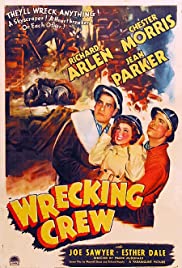
WRECKING CREW
US, 1942, 73 minutes, Black and white.
Richard Arlen, Chester Morris, Jean Parker, Joe Sawyer, Esther Dale.
Directed by Frank Mc Donald.
Wrecking Crew is what might be called a man’s man’s movie. It was released as the United States entered World War II after Pearl Harbor.
While the story is average enough, and the performances solid enough, there are some above average sequences with special effects for the demolition of buildings, especially at the end of the film.
There are not many films about those who knock down buildings! And this is in the period when, as we look back, it might be thought that buildings were going up. However, there was demolition in New York City for further building. No capacity for implosions at this time.
The company is managed by a tough elderly lady called Mike, played with vigour by Esther Dale. The brains in the company is Matt, played by Richard Arlen. The troublemaker is Duke, played by Chester Morris who had been in leading role since the early 1930s and who, at this time was in the series of Boston Blackie films. Joe Sawyer is in the good friend supporting role as a baseball player suffering from an arm injury, needing an operation, getting it but sacrificing himself at the end to save the lives of his friends.
Apart from Esther Dale, there is strong women’s presence with Jean Parker, always lively – this time a young woman caught stealing, suicidal, rescued from the river by Duke, passed of as his cousin, Matt being attracted, getting a job with Mike, having to make an ultimate decision.
Duke is considered a troublemaker and fears he has a jinx, people dying on his watch. However, he has an opportunity to be heroic which leads up to a climax on the top of a collapsing building, a line stretched from the collapse to safety and the slow progress along the line, seeming calamity, but the men being saved, swinging into the windows of a downstairs floor.
There is a religious touch in the film with one of the men inviting his friends to the baptism of his son, welcoming the priest, who has a Polish background as does the family. However, the religious dimension and the moralising of the film, saving other people’s lives, comes from the leader of a Salvation Army Band.
Director Frank Mc Donald began his work in the railroads and progressed through various aspects of filmmaking to writing and directing.
Not bad small-budget supporting feature of the early 1940s with some effective special effects.